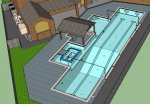Finishing up design on fairly large pool that I plan to owner-build.- ~85,000 gallon 2,064 S.F of water surface area. It will be located in Houston, so winters aren't terribly harsh - For example, it was 88 degrees today on Feb 8th (not normal - beat our previous record high by 4 degrees, but you get the point). That being said, I want to be able to use this pool year round. I am planning on a winter thermal blanket and reel like they use for outdoor swim team pools, but a 400K BTU heater doesn't appear to be enough at first blush.
Question: Can I use a 3-way valve on the inlet and outlet to tie two Pentair 400K BTU Master Temp heaters two one pump (Intelliflow XF)? I see minimum flow is 40 GPM per heater for the 400K BTU Master Temps., so if I'm running 100GPM plus while heating the pool, it seems like that would work. This heat side of the filtration system would feed into 12 floor inlets spread around the pool. Any problems with this theoretical scenario?

Thanks,
JR
Question: Can I use a 3-way valve on the inlet and outlet to tie two Pentair 400K BTU Master Temp heaters two one pump (Intelliflow XF)? I see minimum flow is 40 GPM per heater for the 400K BTU Master Temps., so if I'm running 100GPM plus while heating the pool, it seems like that would work. This heat side of the filtration system would feed into 12 floor inlets spread around the pool. Any problems with this theoretical scenario?

Thanks,
JR

